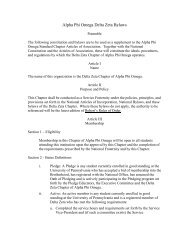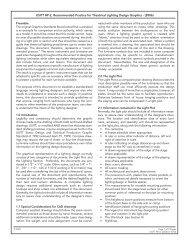Penn Philosophical Perspectives - University of Pennsylvania
Penn Philosophical Perspectives - University of Pennsylvania
Penn Philosophical Perspectives - University of Pennsylvania
- No tags were found...
You also want an ePaper? Increase the reach of your titles
YUMPU automatically turns print PDFs into web optimized ePapers that Google loves.
model, if you assume that people are trying to communicateSo you get a very nice theory from making that assumption, butthat assumption is false.that it involves this non-propositional thinking, including emo-an important part <strong>of</strong> our minds, and our ways <strong>of</strong> thinking. Youcan’t just tell people, “you should be thinking about this thing,”you have to say, “look at this thing you are already interested in,now notice that it requires you to pay attention to this broaderframework.” So I am always looking for ways to make peoplethink about that model <strong>of</strong> meaning. To this point, in the previouslymentioned article and in general, I <strong>of</strong>ten go along withthe ordinary philosophical conception <strong>of</strong> meaning, and I haveto do that because I have to talk to other philosophers, and so Ia restrictive notion. I am teaching a class in the spring calledwhat are the different kinds <strong>of</strong> meaning, and where does meaningcome from, and are there legitimate sources <strong>of</strong> differentto make some systematic sense <strong>of</strong> that. In order for it not to bejust a terminological debate, I think it is important not to simplysay, “you should include this under meaning,” but I increasinglyam starting to be interested in saying, “these are differentkinds <strong>of</strong> meaning,” in addition to the narrow propositional kind.Do you see metaphor as a valuable way <strong>of</strong> expressing meaning,and if so do you think it is in some ways undermined byYes, I think that metaphor, from the standard, traditional, propositional,truth-conditional perspective, looks like a weird devi-would we use this indirect, risky way <strong>of</strong> communicating, whenreally we’re just communicating propositions anyway? I think-a better model <strong>of</strong> the mind, and <strong>of</strong> communication, that makes itcally?I think that one <strong>of</strong> the things that metaphor is really goodfor, one <strong>of</strong> the reasons that we do communicate metaphorically,is because it allows us to communicate these really complex,open-ended ways <strong>of</strong> thinking, in addition to, or even more thanactually say. Sort <strong>of</strong> the classic example, which I talk about in-all I am saying in my letter <strong>of</strong> recommendation, that’s a prettyJanuary 2010<strong>Penn</strong> <strong>Philosophical</strong> <strong>Perspectives</strong>bad philosopher, but I’m not saying that, so I’m communicat-at, and it is not the only kind <strong>of</strong> speech that does this, but it isespecially good at communicating not just one or a couple <strong>of</strong>extra propositions, but a whole way <strong>of</strong> thinking, a whole attitude,including especially emotional responses.Another topic you were talking about is the difference betweensemantics and pragmatics. In terms <strong>of</strong> the relationbetween meaning and creating new frameworks for thinkingabout the philosophy <strong>of</strong> mind and philosophy <strong>of</strong> lan-The more I talk to linguists, the more this is a really interestingquestion to me. So many people assume that metaphor isa pragmatic phenomenon; what that means is that when youspeak metaphorically, you say words that have one convention- the pragmatic meaning is different from the semantic meaning.you mean the opposite <strong>of</strong> what you say. There are all these questionsabout how to understand the relationships within pragmatics,how to understand the relationship between different kinds<strong>of</strong> pragmatic meaning, different ways in which speakers mightbeen focused within pragmatics; my work in the philosophy <strong>of</strong>language on metaphor has focused on where within pragmaticsdoes metaphor go, assuming that it doesn’t go into semantics.any linguistic phenomenon that is systematic you should try toput it into semantics if possible; that is you should appeal to adifference between what the words mean and what the speakermeans by using those words only as a last resort.out thinking that I was going to show these people that theyare wrong because the assumptions that they are using to argueagainst my view about metaphor would show that not just metaphor,but sarcasm is a semantic phenomenon, and it seems thatthey say that actually some <strong>of</strong> the things that suggests are reallycool, that sarcasm or some parts <strong>of</strong> sarcasm could be semantic.So that means the way we think about what semantics couldbe different than what philosophers have traditionally assumed. know anything about semantics we know about the differencebetween semantics and pragmatics and we know that sarcasmand probably metaphor belong in pragmatics not in seman-it seems like actually you could put this stuff in semantics too.So then the question turns to, what do we want semantics to be?story we can tell, about meanings associated with words thathelp to predict what speakers do with those words. So the moreyou can get systematic predictions by packing it into the semantics,the better.28
















